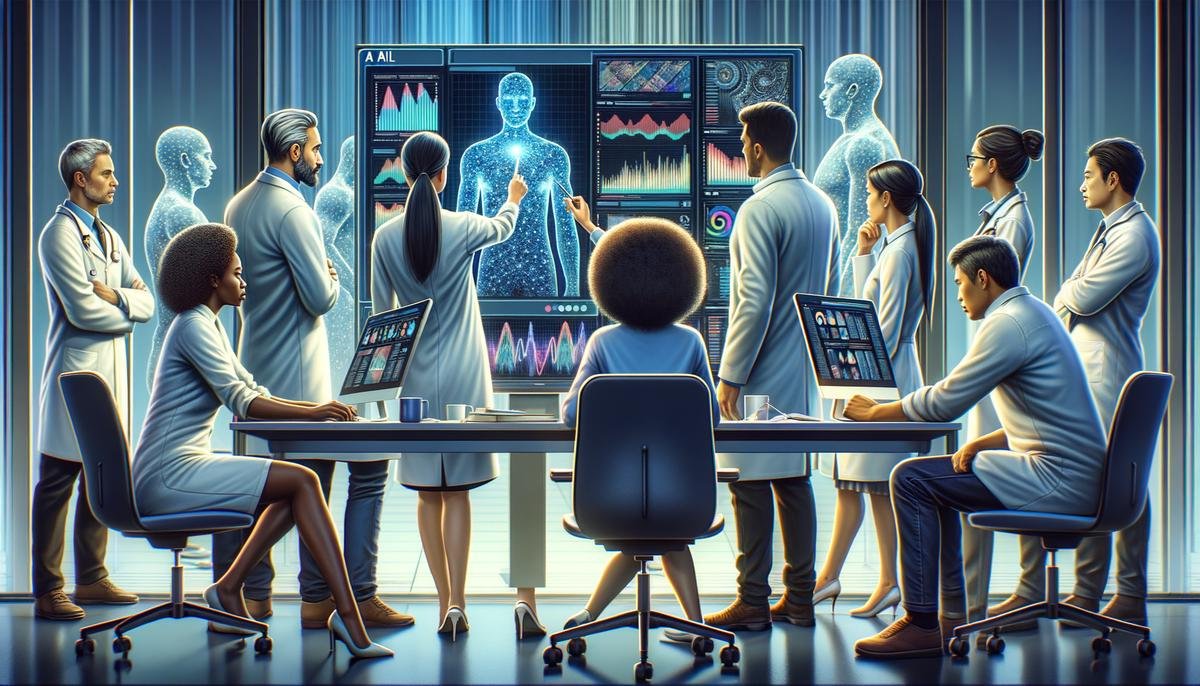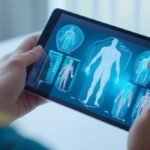Generative AI is advancing in healthcare, offering solutions for medical decision-making and disease detection. Google’s models like Med-PaLM 2 and MedLM are changing how clinicians interact with data and improve patient care.
Generative AI in Healthcare
Google’s Med-PaLM 2 and MedLM models are revolutionizing medical decision-making and disease detection. Med-PaLM 2 demonstrates advanced reasoning capabilities and improved diagnostic accuracy, helping clinicians process large amounts of data efficiently.
MedLM offers models optimized for various healthcare uses, excelling in:
- Interpreting medical imaging
- Analyzing patient records to identify patterns
- Synthesizing potential treatments from recent medical studies
Google’s Articulate Medical Intelligence Explorer (AMIE) has shown significant progress in diagnostic reasoning, engaging in simulated text consultations with patient actors. It asks relevant questions, mimicking real-world clinical dialogues.
Recent improvements include adapting the Google Gemini model for medical tasks, such as generating reports for X-rays and brain scans. This assists radiologists in creating accurate reports.
The personal health LLM developed with Fitbit provides personalized health and wellness insights based on device data. It examines sleep patterns, exercise intensity, and heart rate variability, offering advice similar to a human coach.
“Google’s healthcare AI advancements focus on improving health equity.”
Google Lens now allows users to photograph their skin to find visually-similar matches, improving access to health information. YouTube’s Aloud dubbing tool translates health-related content into multiple languages, expanding its reach.
The MedLM for Chest X-ray model aids in classifying chest X-rays, supporting screening and diagnostics. This development emphasizes using AI for operational and diagnostic purposes.
Initiatives like the Skin Condition Image Network (SCIN) dataset provide diverse dermatology images, ensuring AI models account for various skin tones and conditions.
The collaboration with Apollo Radiology International in India showcases AI’s role in early disease detection, aiming to enhance healthcare access and outcomes.

Health Equity and Bias Prevention
Google’s efforts to address and reduce biases in medical AI include the Health Equity Assessment of Machine Learning Performance (HEAL). This framework examines AI tools to ensure they function fairly across diverse populations.
The Skin Condition Image Network (SCIN), developed with Stanford Medicine, provides an extensive open-access dataset of dermatology images representing various skin tones, ages, and conditions. This diversity is essential in training AI models to accurately diagnose skin conditions across all demographics.
Google has also created the EquityMedQA datasets for adversarial testing, challenging AI models to identify and address potential biases. These initiatives enhance the effectiveness and reliability of AI models while fostering health equity.

Personal Health Large Language Model (PH-LLM)
The Personal Health Large Language Model (PH-LLM) provides personalized health and wellness coaching. Developed from the Gemini model, it uses data from Fitbit and Pixel devices to offer customized health insights and recommendations.
PH-LLM uses a multimodal encoder to analyze metrics such as:
- Heart rate variability
- Sleep duration
- Physical activity intensity
It delivers comprehensive advice aligned with individual health goals.
The model’s performance is assessed on:
- Long-form coaching tasks
- Expert domain knowledge
- Prediction of self-reported sleep outcomes
Evaluations have shown that PH-LLM’s recommendations are comparable to those made by human experts.
By predicting self-reported sleep outcomes accurately, PH-LLM demonstrates its ability to reflect users’ perceptions of their health states. This model represents Google’s vision for AI providing personalized health assistance, bridging the gap between everyday health monitoring and expert medical advice.
AI Tools for Clinicians
Google’s AI tools for clinicians include the Articulate Medical Intelligence Explorer (AMIE) and MedLM for Chest X-ray. AMIE simulates interactive dialogues with patient actors, showing the ability to match or exceed human clinicians in diagnostic accuracy and empathetic communication.
MedLM for Chest X-ray aids in the interpretation and analysis of chest X-rays, generating comprehensive reports with targeted insights and recommendations. This tool helps reduce radiologists’ workload and improves the efficiency of radiological practices.
These AI tools enhance clinical workflows across various aspects of patient care. They are designed to assist, rather than replace, healthcare professionals, emphasizing the human-centered aspect of medical care augmented by AI.

Enhancing Health Information Accessibility
Google is improving access to health information through AI-powered tools. Google Lens allows users to photograph their skin to find visually similar matches online, helping individuals understand their symptoms better.
YouTube’s AI-powered dubbing tool, Aloud, translates health content into multiple languages, broadening the availability of vital health information globally.
Google Cloud’s Healthcare Data Engine (HDE) creates a unified patient data platform, improving both patient care and operational efficiency. Vertex AI Search for Healthcare offers medically tuned search results and sophisticated question-answering capabilities, ensuring healthcare providers can quickly access relevant information.
These innovations demonstrate Google’s commitment to improving health information accessibility, enabling users and healthcare professionals to easily access and understand complex health data.

In summary, Google’s generative AI models are reshaping healthcare by aiding in medical decision-making, disease detection, and personal health insights, promising improved patient care and health outcomes1. These advancements represent a significant step forward in the integration of AI technology with healthcare practices, potentially revolutionizing how we approach medical care and health management2.
- Esteva A, Kuprel B, Novoa RA, et al. Dermatologist-level classification of skin cancer with deep neural networks. Nature. 2017;542(7639):115-118.
- Topol EJ. High-performance medicine: the convergence of human and artificial intelligence. Nat Med. 2019;25(1):44-56.




